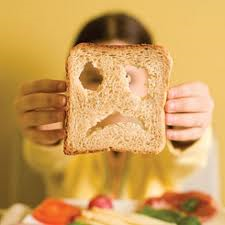On the Psychological effects of Coeliac Disease
Psychological aspects of Coeliac Disease
By Anna Milleri
The last few years have seen a significant increase in diagnosed cases of Coeliac Disease (CD) in Western Countries (approximately 1% of the population with regional differences) and although it is still unclear whether this is due to increased (and more accessible) information and resources to both clinicians and the general public, thus leading to more people being diagnosed, or if there has been an actual increase in the number of people affected by the disease, one thing we know is that people with CD are faced with a number of psychological challenges linked to the illness and that there is a growing and urgent need to further investigate those aspects in order to provide CD sufferers with information, support, skills and strategies to address and overcome critical phases and the psychological challenges of coping with a lifelong autoimmune disease, that to date has no cure and can only be managed through a strict compliance to a gluten free diet and subsequent lifestyle changes.
In this article I will briefly look at some of the above mentioned “critical” areas, such as:
Pre-diagnose phase:
It is estimated that up to 75% of CD cases remain undiagnosed and among those who are, many will experience a significant delay between the onset of symptoms and a finalised diagnosis. Undiagnosed CD leaves the person dealing, sometimes for years, with acute and debilitating symptoms they can’t explain or make sense of. In some cases CD sufferers mainly experience gastrointestinal symptoms, while in other cases symptoms can be of a varied nature and sometimes even absent (silent CD). The variety of symptoms can lead to difficulties and even more delay in finally getting an answer to their complaints and an explanation for their crippling symptoms.
Being diagnosed with CD:
Being diagnosed with CD, although often associated with feelings of relief, reassurance and re-gained control over symptoms and one’s own life in general, can nonetheless be extremely traumatic and confusing, especially if not associated with the correct information and support. Also, at a psychological level, such a diagnose can be very overwhelming, as one learns that CD is for life with its treatment demanding for a number of important dietary and lifestyle changes. Being diagnosed with CD also requires a series of adjustment of the person’s sense of identity, which may lead to a perception of themselves as ‘ill’ and different, with the disease taking over their whole sense of identity with associated feelings of frustration, helplessness, social isolation and depression.
Post-diagnose and compliance with gluten free diet:
Compliance with a gluten free diet (GFD) and symptom management pose specific challenges at both a psychological and social level, as they require numerous and consistent changes and adaptations in daily activities and routine, sometimes causing significant limitations to the person’s social life (e.g. avoiding social situations, like eating out or travelling), and thus affecting their overall quality of life in different ways. Some people can react to the diagnosis with anger and denial, deliberately non complying with the dietary and lifestyle changes that are necessary to manage the symptoms, while others go through periods of withdrawal from social activities and loss of interest for things in life they once loved (e.g. ‘eating out is so difficult and frustrating that I’d rather stay home and isolate myself from my friends)
An Invisible Illness:
Coeliac Disease, as well as other so called invisible illnesses, is not visible to others through physical manifestations of the medical condition, and because of this, in some cases support and understanding from others may be unavailable or denied to people with CD in different social, and sometimes family settings.
At a psychological level, every step of the way from the onset of symptoms to the diagnosis, to the compliance with a gluten free diet and lifestyle, poses specific challenges that can leave the person overwhelmed by feelings of helplessness, hopelessness, powerlessness, confusion, anxiety, depression, isolation, loss (e.g. loss of one’s own sense of identity, loss of control over their own body, loss of parts/aspects of their social life).
Questions like ‘why me?’, ‘why has my body let me down?’ and thoughts like ‘my life will never be the same again’, ‘I’m stuck with this for life’ will arise at some stage, especially around the diagnosis time, when the person is confronted for the first time with a great amount of information that can be very hard to process and sometimes very confusing.
That is why it is very important, during the diagnosis phase, that the person is provided with clear, accurate and comprehensive information and that resources and support are available and accessible.
At the moment there isn’t a great number of studies investigating the psychological aspects of CD. However, most of them seem to come to the same conclusions and suggestions when it comes to strategies to build psychological resilience, overcome feelings of helplessness and depression, preserve a positive sense of identity and look after one’s own mental health:
Information, resources and support. Search for reliable medical sources and look for as detailed information as you can in relation to CD and what treatment entails and give yourself time to process and adapt/adjust to the changes that are required to comply with GF diet and lifestyle. Actively look for help and build a support net around you (join associations and communities, real and online, involve family, friends and work if necessary), learn how to recognise times of high stress, monitor your mental health and avail of professional help if you feel you’re going through a period when you’re struggling to cope or feel overwhelmed.
Focus on what you CAN. Suffering from CD can make you feel like you’re not in control of your body, or as if your body has let you down. Restrictions imposed by a strict compliance to a GF diet and lifestyle can sometimes take their toll on your ability to positively respond to the numerous everyday challenges. That can lead to a negative attitude and an excessive focus on what you’ve lost, missed, or can’t do anymore, forgetting about what is actually still in your control and power to achieve.
Be proactive, get involved. Join associations, groups, communities and get actively involved in raising awareness and help others. Share your experience with others and be proactive in finding creative solutions to specific problems.
Plan ahead and get into a routine that fits your personality and lifestyle. Although you’re going through a ‘revolution’ in your daily routine, habits etc, you can still make it fit your unique personality and way of life. There is no one single recipe for everyone.
Anna Milleri is a Psychologist Member of the Italian Board of Psychology and Psychotherapist full member of APPI (Association for Psychoanalysis and Psychotherapy in Ireland), co-founder of Area Mentis Psychotherapy Centre.
Contacts: www.areamentis.com [email protected]



